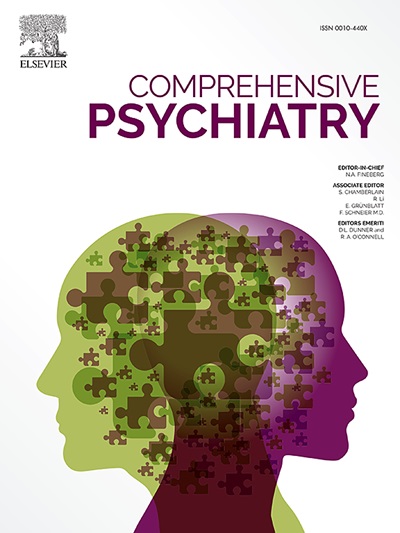Assessing prolonged grief symptoms using experience sampling methodology: The development of the prolonged grief symptoms - short ecological assessment (PGS-SEA) scale
IF 4.2
2区 医学
Q1 PSYCHIATRY
引用次数: 0
Abstract
Early grief reactions have been hypothesized to fluctuate within persons and to be one of the strongest predictors of Prolonged Grief Disorder (PGD). Experience Sampling Methodology (ESM) offers an opportunity to examine (early) PGD dynamics in daily contexts. For this, however, a brief and valid ESM scale is needed to accurately assess PGD symptoms in everyday life. We investigated the psychometric properties of ESM items developed to assess momentary prolonged grief symptoms in daily life (ESM-PGD). Additionally, we aimed to create a valid brief scale for future ESM studies. Bereaved adults (N = 169) whose loved ones died 3–6 months earlier completed 11 ESM-PGD items based on 10 PGD symptoms, as defined in DSM-5-TR, five times a day for 14 consecutive days at semi-random intervals. We performed multilevel confirmatory factor analysis (MCFA), calculated root-mean-square of successive differences (RMSSD) and intraclass correlations (ICC), and conducted correlational analyses of ESM-PGD items with related mental health symptoms (e.g., depression) to identify the best-performing items. MCFA confirmed that the hypothesized one-factor model fits the data well with good composite reliability at the between- and within-person levels. All ESM-PGD items were able to distinguish between people with and without early PGD. Examination of within-person level factor loadings, ICCs and RMSSDs revealed that not all ESM-PGD items were able to capture fluctuations of momentary PGD symptoms. The best-performing items were selected, resulting in a valid 2-item Prolonged Grief Symptoms – Short Ecological Assessment (PGS-SEA) scale for assessing PGD in daily life to facilitate ESM-research on PGD.
使用经验抽样方法评估长期悲伤症状:长期悲伤症状--短期生态评估(PGS-SEA)量表的开发
早期悲伤反应被假设在人体内波动,并且是长期悲伤障碍(PGD)的最强预测因子之一。经验抽样方法(ESM)提供了在日常环境中检查(早期)PGD动态的机会。因此,需要一个简单有效的ESM量表来准确评估日常生活中的PGD症状。我们研究了用于评估日常生活中短暂延长悲伤症状(ESM- pgd)的ESM项目的心理测量特性。此外,我们的目标是为未来的ESM研究创建一个有效的简要量表。丧失亲人3-6个月前死亡的成人(N = 169)根据DSM-5-TR中定义的10种PGD症状完成了11项ESM-PGD项目,每天5次,以半随机间隔连续14天。我们进行了多水平验证性因子分析(MCFA),计算了连续差异均方根(RMSSD)和类内相关性(ICC),并对ESM-PGD项目与相关心理健康症状(如抑郁)进行了相关分析,以确定表现最佳的项目。MCFA证实,假设的单因素模型在人与人之间和人与人之间的水平上具有良好的复合可靠性。所有ESM-PGD项目都能够区分早期PGD患者和非早期PGD患者。对个人水平因子负荷、ICCs和rmssd的检查显示,并非所有ESM-PGD项目都能捕捉到瞬时PGD症状的波动。选择表现最佳的项目,形成有效的2项延长悲伤症状-短期生态评估(PGS-SEA)量表,用于评估日常生活中的PGD,以促进PGD的esm研究。
本文章由计算机程序翻译,如有差异,请以英文原文为准。
求助全文
约1分钟内获得全文
求助全文
来源期刊

Comprehensive psychiatry
医学-精神病学
CiteScore
12.50
自引率
1.40%
发文量
64
审稿时长
29 days
期刊介绍:
"Comprehensive Psychiatry" is an open access, peer-reviewed journal dedicated to the field of psychiatry and mental health. Its primary mission is to share the latest advancements in knowledge to enhance patient care and deepen the understanding of mental illnesses. The journal is supported by a diverse team of international editors and peer reviewers, ensuring the publication of high-quality research with a strong focus on clinical relevance and the implications for psychopathology.
"Comprehensive Psychiatry" encourages authors to present their research in an accessible manner, facilitating engagement with clinicians, policymakers, and the broader public. By embracing an open access policy, the journal aims to maximize the global impact of its content, making it readily available to a wide audience and fostering scientific collaboration and public awareness beyond the traditional academic community. This approach is designed to promote a more inclusive and informed dialogue on mental health, contributing to the overall progress in the field.
 求助内容:
求助内容: 应助结果提醒方式:
应助结果提醒方式:


